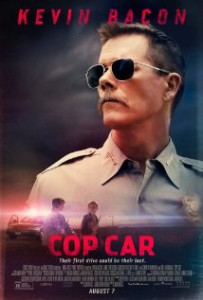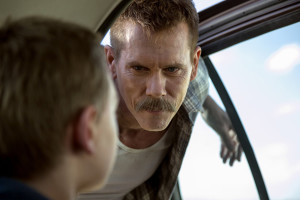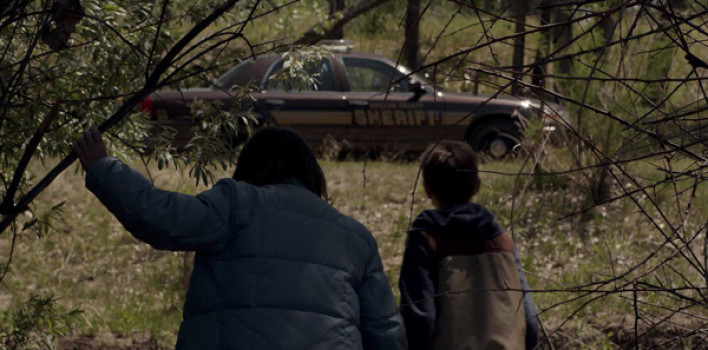Art & Indie Corner| Cop Car
 Marvel recently tapped Jon Watts to direct their upcoming Spider-Man re-re-reboot, which begs an interesting question: How does a young director prepare to tackle a project of such magnitude? Watts’s response seems to be akin to that of Jonah, who initially fled to the farthest corner of the known world when he was called out by God; in Cop Car Watts has created a film that is, in a certain sense, the antithesis of what Marvel embodies: small budget, small scale, minimalist and incredibly intimate. On the other hand, his work as both director and writer of Cop Car makes it abundantly clear why the comic book giant wants him on their team. Watts’s deft storytelling, steady-handed direction, and Hitchcockian ability to create tension makes this film a remarkably enjoyable break from the big-budget summer films.
Marvel recently tapped Jon Watts to direct their upcoming Spider-Man re-re-reboot, which begs an interesting question: How does a young director prepare to tackle a project of such magnitude? Watts’s response seems to be akin to that of Jonah, who initially fled to the farthest corner of the known world when he was called out by God; in Cop Car Watts has created a film that is, in a certain sense, the antithesis of what Marvel embodies: small budget, small scale, minimalist and incredibly intimate. On the other hand, his work as both director and writer of Cop Car makes it abundantly clear why the comic book giant wants him on their team. Watts’s deft storytelling, steady-handed direction, and Hitchcockian ability to create tension makes this film a remarkably enjoyable break from the big-budget summer films.
Cop Car eschews a conventional exposition. We meet the two young protagonists, Travis (James Freedson-Jackson) and Harrison (Hays Wellford), as they walk through a vast, arid field. They’ve decided to run away from home and seem to have gotten farther than most children who have dared to embark on such a rebellious quest. After hours of wandering without aim, they stumble upon a seemingly abandoned cop car and decide to take it for a spin. The only problem is that the car’s owner, a crooked sheriff played by Kevin Bacon, has something valuable in the trunk, and he wants it back.
 One of the more alluring aspects of Cop Car is Watts’s commitment to a minimalist narrative that is reminiscent of the literary work of Cormac McCarthy. The characters’ backstories are not explained. We never learn why the boys ran away from home; we never figure out what we long to know about the mystery object contained inside the sheriff’s trunk. Kevin Bacon’s performance is largely wordless, made up of grunts, sighs, and strained facial expressions. Instead of listening to characters explain what they are about to do, we simply watch them as they take action. One beautifully executed example of this is a scene in which we watch Kevin Bacon’s character struggle (for what seems like an eternity) to open a locked car door. The camera lingers as he tries and fails, tries and fails, tries and fails. It’s excruciatingly tense and a perfect example of how a film with such stripped-down narrative is so engrossing, well-paced, and thrilling.
One of the more alluring aspects of Cop Car is Watts’s commitment to a minimalist narrative that is reminiscent of the literary work of Cormac McCarthy. The characters’ backstories are not explained. We never learn why the boys ran away from home; we never figure out what we long to know about the mystery object contained inside the sheriff’s trunk. Kevin Bacon’s performance is largely wordless, made up of grunts, sighs, and strained facial expressions. Instead of listening to characters explain what they are about to do, we simply watch them as they take action. One beautifully executed example of this is a scene in which we watch Kevin Bacon’s character struggle (for what seems like an eternity) to open a locked car door. The camera lingers as he tries and fails, tries and fails, tries and fails. It’s excruciatingly tense and a perfect example of how a film with such stripped-down narrative is so engrossing, well-paced, and thrilling.
 Watts has also written some wonderfully clever dialogue. The two ten-year-old protagonists deliver the majority of the lines in the film, and the script bears the mark of an author who is intimately familiar with the thought process and speech of preteen boys. “I dare you to touch it,” one of them prompts when they find the abandoned police cruiser. In another instance, they reason that people will think they’re cops if they see them driving down the highway. Watts’s screenwriting is not only incredibly realistic, it also adds a darkly comedic edge that balances the film’s intensity.
Watts has also written some wonderfully clever dialogue. The two ten-year-old protagonists deliver the majority of the lines in the film, and the script bears the mark of an author who is intimately familiar with the thought process and speech of preteen boys. “I dare you to touch it,” one of them prompts when they find the abandoned police cruiser. In another instance, they reason that people will think they’re cops if they see them driving down the highway. Watts’s screenwriting is not only incredibly realistic, it also adds a darkly comedic edge that balances the film’s intensity.
In spite of its comedic element and in light of current events, however, it is difficult not to see this tale of a law enforcement officer who abuses his authority as a sort of social commentary. Perhaps the film embodies some of the current frustration and indignation at the notable injustices that have been perpetrated by uniformed officers. At the very least, it is a reflection of the troubling reality that our justice system is flawed and broken. Cop Car is ultimately, then, about the business of making its audience long for justice and rest in an unjust, restless land.







